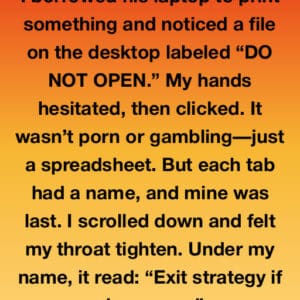When the gavel fell, James leaned back like a conquering king. He flashed that grin—wide, white, and empty—and let his gaze skim the stack of papers that supposedly gave him everything: the house, the cars, the accounts, even the furniture we picked out when we still believed in “forever.” On paper, I was the picture of defeat.
I zipped my bag, stood, and laughed. Not loud—just enough that the bailiff glanced over. James thought he’d won. He had no idea he’d walked straight into the trap he built himself.
I met him a decade ago, all charm and borrowed confidence, spinning dreams about the things he’d own: a house with columns, a garage with keys that outnumbered the cars, vacations curated for envy. I told myself his hunger was ambition. I told myself love would slow him down, deepen him, anchor him to something real.
It didn’t. Every promotion became a purchase, every raise a new watch, every dinner a performance we could barely afford. My husband loved two things: mirrors and spectators. He dressed me like a prop—handbags I didn’t want, jewelry I never asked for—because appearances were his altar.
There was one thing he never saw: my mother.
We couldn’t afford the down payment for the house he “needed,” so my mother wrote a check. Her only condition was simple: she’d live with us, in the downstairs suite. He agreed without blinking. “She’s quiet,” he said. “As long as I get the house, I don’t care.”
He forgot the moment the keys touched his palm. She moved in. She cooked in silence, tended roses out back, folded her life into the corners of ours. He treated her like part of the décor.
Meanwhile, the marriage curdled. Twice I packed a bag; twice he talked me down—first with promises, then with threats. I stayed, but started planning. You can’t out-scream a man who worships the image of winning. You outflank him.
So I stopped fighting over things. I let him believe I was tired, compliant, beaten. When his lawyer demanded it all in the divorce, I nodded. The house? Take it. The cars? Enjoy them. The accounts? Yours. He preened. My lawyer stared at me like I’d set fire to myself.
But nothing on that list had ever really been his.
Buried in the deed—filed the week we closed on the house, notarized, witnessed, and thoroughly legal—was my mother’s life estate. She had the right to live there until the day she died. Owners could change; her key would not.
The day after court, James returned to “his” house like Caesar returning to Rome. Champagne. Friends drifting through the rooms, offering compliments as if they were currency. He didn’t notice my mother sitting at the edge of the living room, tea in hand, watching the parade.
Reality arrived by Tuesday.
She cooked with spices that lingered in the curtains. She invited her bridge club twice a week. She watched the evening news at a volume that could troubleshoot a failing hearing aid. She planted herbs in the front garden, the kind that spread and refused to be ornamental. When he told her to leave, she pulled out the deed he’d never read and patted the empty chair beside her.
“I’ll be here as long as I live, James. You agreed to that.”
He blinked. He had. He just hadn’t cared enough to remember.
I moved into a small apartment that felt bigger than any room I’d had with him. I poured myself into my work. Without James’s appetite sucking our accounts dry, my consulting grew—steadily, then all at once. Clients recommended me. My days filled with projects and color. My nights filled with quiet that didn’t feel like punishment.
Gossip travels. I heard his dinners dwindled once guests realized there would be no rooftop DJ over my mother’s classical station. Contractors refused his “quick updates” when they learned about a tenant who could veto renovations. A year later he tried to sell; buyers balked at the clause attached to the property like a heartbeat. The offers were low enough to bruise his ego and his spreadsheets.
I visited my mother on weekends. We sat in the garden with the herbs perfuming the air. “Do you regret tying yourself to the house?” I asked once.
She smiled, eyes bright. “I didn’t give him anything. I gave you security—one way or another.”
She had. The house was his trophy and his cage. He’d clawed for it, only to learn the bars were legal and living and making tea at 6 a.m.
Three years on, my life is quieter, smaller in square footage, larger in meaning. I paint again. I travel. I say yes to dinners with friends and no to anything that smells like performance. The business pays my bills and then some. My mother still tends her garden. James still lives in the house he can neither sell at a profit nor stage for applause. His reputation—once polished to a mirror—has dulled from the friction of reality.
People ask whether I regret “giving him everything.” I smile.
I didn’t give him everything. I let him keep nothing of value. Freedom, peace, and the satisfaction of watching greed tighten its own knots—those came with me when I walked out of that courtroom and laughed.





